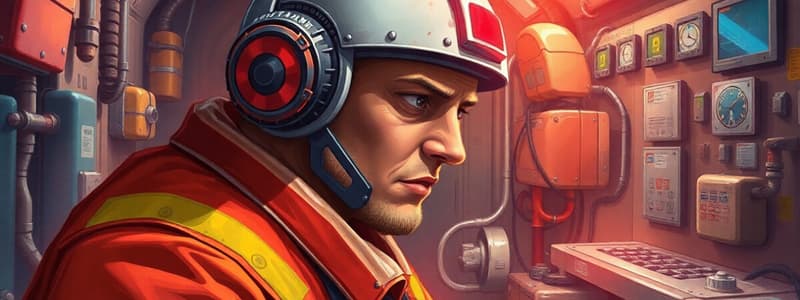Podcast
Questions and Answers
What primary unsafe act directly led to the oiler's fall and subsequent head injury?
What primary unsafe act directly led to the oiler's fall and subsequent head injury?
- Working alone on a complex task at an elevated height without a barrier. (correct)
- Lack of experience in moving heavy cylinder heads.
- Failure to use appropriate personal protective equipment (PPE).
- Improper lifting technique when using a chain block.
Which of the following statements reflects a key reason why the risk associated with the task was underestimated?
Which of the following statements reflects a key reason why the risk associated with the task was underestimated?
- The oiler was unfamiliar with the engine room layout.
- The toolbox talk was conducted by an inexperienced supervisor.
- The cylinder head was lighter than initially estimated.
- The oiler had successfully performed similar tasks in the past, leading to complacency. (correct)
In the context of preventing similar incidents, what is the MOST important purpose of conducting a toolbox talk before starting the task?
In the context of preventing similar incidents, what is the MOST important purpose of conducting a toolbox talk before starting the task?
- To ensure all workers are aware of the company's safety policies.
- To document the steps taken to complete the task efficiently.
- To assign roles and responsibilities to each team member.
- To identify potential hazards and discuss safe work procedures. (correct)
Besides working with a buddy, what measure could be taken to mitigate the risk of falling from the elevated area?
Besides working with a buddy, what measure could be taken to mitigate the risk of falling from the elevated area?
What should crew members reiterate to continuously improve safety?
What should crew members reiterate to continuously improve safety?
Flashcards
Root Cause: Underestimation
Root Cause: Underestimation
Underestimating task complexity and potential injury when working alone.
Complacency in familiar tasks
Complacency in familiar tasks
Performing tasks repeatedly can lead to overconfidence and a belief in one's ability to handle the job alone.
Unprotected elevated areas
Unprotected elevated areas
Lack of physical barriers on elevated areas increases the risk of falls and injuries.
Inadequate Tool Use
Inadequate Tool Use
Signup and view all the flashcards
Never let familiarity lead to complacency
Never let familiarity lead to complacency
Signup and view all the flashcards
Study Notes
- An oiler suffered head injuries while working alone in the engine room
- The incident was published and generated on March 6, 2025, as IMCA SF 04/25
What Happened
- While working alone, an oiler was hurt in the engine room
- An oiler moved a heavy cylinder head to be lifted with a chain block
- A pipe was used to pivot the cylinder while the oiler stood in an elevated area facing a lower area
- The pipe slipped while the oiler was holding it, leading to a fall and head injuries
What Went Wrong
- Underestimation of the task's complexity, seriousness, and injury potential
- Overconfidence from prior similar tasks
- Lack of a barrier at the unprotected elevated area
- The pipe was too small for the cylinder head hole
- No on-site toolbox talk to identify potential hazards
Lessons and Actions
- Always follow safety protocols, avoid complacency
- Work with a buddy when possible for tasks that require it
- Barrier off elevated areas
- Toolbox talks are very important to improving safety whether the tasks are routine or non-routine
Additional Information
- IMCA Safety Flashes summarize safety matters and incidents for the offshore industry's benefit
- The effectiveness of the IMCA Safety Flash system depends on the industry sharing information and so avoiding repeat incidents
- Incidents are classified according to IOGPs Life Saving Rules
Studying That Suits You
Use AI to generate personalized quizzes and flashcards to suit your learning preferences.




